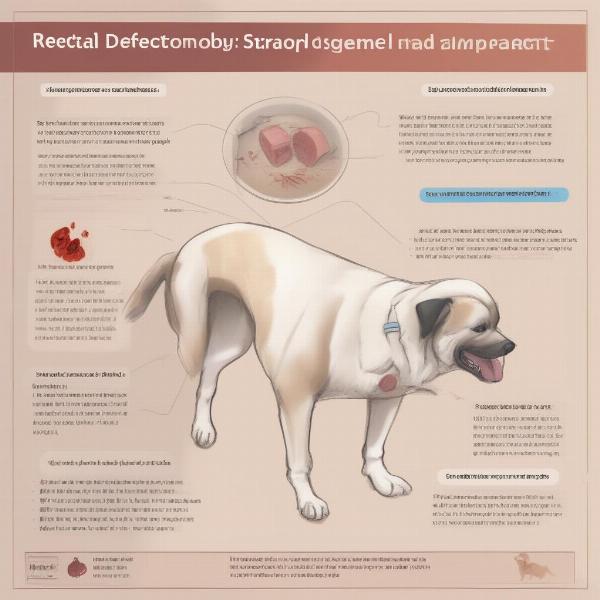Rectal carcinoma in dogs, a malignant tumor affecting the rectum, is a serious health concern that requires prompt diagnosis and treatment. This article will cover the causes, symptoms, diagnosis, treatment options, and prognosis for rectal carcinoma in dogs, empowering owners with the knowledge to navigate this challenging situation.
 Rectal Carcinoma Symptoms in Dogs
Rectal Carcinoma Symptoms in Dogs
Understanding Rectal Carcinoma
Rectal carcinoma develops from the glandular cells lining the rectum. While the exact cause remains unknown, several factors may contribute to its development, including genetics, chronic inflammation, and environmental toxins. This type of cancer can be aggressive, potentially spreading to nearby lymph nodes and other organs. Early detection and intervention are crucial for improving a dog’s chances of survival and quality of life.
Recognizing the Signs: Symptoms of Rectal Carcinoma
The symptoms of rectal carcinoma in dogs can be subtle and easily mistaken for other digestive issues. Be vigilant for the following signs:
- Straining to defecate (tenesmus)
- Blood in the stool (hematochezia)
- Ribbon-like stools
- Weight loss
- Decreased appetite
- Lethargy
- Vomiting (less common)
Diagnosing Rectal Carcinoma
If you observe any of these symptoms, consult your veterinarian immediately. They will perform a thorough physical examination, including a digital rectal exam. Further diagnostic tests may be necessary to confirm the diagnosis and assess the extent of the disease:
- Digital rectal exam: This allows the veterinarian to palpate the rectum for any masses or abnormalities.
- Biopsy: A small tissue sample is collected for microscopic examination to confirm the presence of cancer cells.
- Ultrasound: This imaging technique can help visualize the tumor and assess its size and location.
- Radiographs (X-rays) and CT scans: These can be used to evaluate for metastasis to other organs, such as the lungs or liver.
Treatment Options for Rectal Carcinoma
Treatment for rectal carcinoma depends on the stage of the cancer and the overall health of the dog. Options may include:
- Surgery: Surgical removal of the tumor is the primary treatment for rectal carcinoma. The extent of the surgery will depend on the size and location of the tumor. In some cases, a portion of the rectum may need to be removed.
- Chemotherapy: Chemotherapy may be used in conjunction with surgery to kill any remaining cancer cells and reduce the risk of recurrence.
- Radiation therapy: Radiation therapy can be used to shrink the tumor before surgery or to treat tumors that are not surgically accessible.
- Palliative care: For dogs with advanced rectal carcinoma, palliative care focuses on managing pain and improving quality of life.
Prognosis and Long-Term Care
The prognosis for dogs with rectal carcinoma varies depending on the stage of the cancer at diagnosis. Early detection and aggressive treatment offer the best chance for long-term survival. Following treatment, regular check-ups with your veterinarian are essential to monitor for recurrence and manage any potential complications.
Living with a Dog Diagnosed with Rectal Carcinoma
A diagnosis of rectal carcinoma can be devastating, but with proper care and support, dogs can still enjoy a good quality of life. Maintaining a healthy diet, providing regular exercise, and managing pain are crucial for their well-being. Open communication with your veterinarian is essential throughout the journey.
Conclusion
Rectal carcinoma in dogs is a serious condition requiring prompt veterinary attention. Understanding the signs, diagnosis, and treatment options can help owners make informed decisions and provide the best possible care for their beloved companions. While the journey can be challenging, early intervention and a dedicated approach can significantly improve a dog’s prognosis and quality of life. Remember to consult with your veterinarian for personalized advice and support.
FAQ
- What is the most common symptom of rectal carcinoma in dogs? Straining to defecate is often the first and most noticeable symptom.
- Is rectal carcinoma curable in dogs? The chances of a cure depend on the stage of the cancer at diagnosis. Early detection and treatment offer the best prognosis.
- How can I prevent rectal carcinoma in my dog? While the exact cause is unknown, maintaining a healthy diet and regular veterinary check-ups can help with early detection.
- What is the life expectancy of a dog with rectal carcinoma? This depends on various factors, including the stage of cancer, the treatment chosen, and the individual dog’s response. Discuss this with your vet.
- What should I feed my dog if they have rectal carcinoma? Consult with your veterinarian for dietary recommendations, as nutritional needs may change during and after treatment.
- How can I manage my dog’s pain if they have rectal carcinoma? Your vet can prescribe pain medication and suggest other methods to help keep your dog comfortable.
- What are the long-term side effects of treatment for rectal carcinoma? Side effects vary depending on the treatment but can include digestive issues, skin irritation, and fatigue.
Related Articles
About ILM Dog
ILM Dog (ilmdog.com) is a leading online resource for dog owners worldwide, dedicated to providing expert advice on all aspects of dog care and wellbeing. From breed selection and puppy care to senior dog health and training, we offer practical guidance backed by veterinary expertise. Our articles cover a wide range of topics, including health, nutrition, behavior, grooming, and product reviews, helping you make informed decisions for your furry friend. For personalized advice or further inquiries, reach out to our team via email at [email protected] or by phone at +44 20-3965-8624.